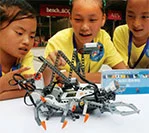PRAGMATIC: It is only through advances in education, science and technology that it can develop comprehensively
IN the book The Governance of China (Foreign Languages Press, Beijing, 2014), which is a compilation of some 80 recent speeches by President Xi Jinping, the leader of Asia’s largest country talks about the need for the country to develop in no uncertain terms. A strong strain of realism and pragmatism runs through all the speeches by Xi, where he realistically appraises China’s prospects in the future and notes that two main obstacles stand in the way of China’s rise: the structural and institutional barriers to economic reform, and China’s need to leap into the modern technological age and lead the way in scientific research and education.
The most refreshing aspect of the book is the realism that is foregrounded time and again. Here, we get a glimpse into the internal workings of the leadership of the Communist Party of China and what the priorities of the leadership are. Xi repeatedly asserts in many of his speeches that due to China’s vast geographical size (9.5 million square kilometres) and demography (more than 1.3 billion citizens), the country cannot possibly afford to lag behind in the development race. There is no nostalgia at all for a quaint, idyllic, agrarian past of rice fields and happy peasants. The only way for the country to go is forward.
China’s comprehensive development policy is one that equates development with both social and political security, on the grounds that an underdeveloped China would also be a vulnerable and dependent country, and one open to external intervention in other forms. It is imperative, Xi asserts, that China develops comprehensively; and for this to happen, it needs to win the technological race — for, it is through advances in education, science and technology that the population will be better-educated and catered to in terms of other socio-economic needs.
One of the most telling quotes to be found in the book is where he speaks about the need for a large and modern pool of scientists and specialists: “China is a country that is rich in manpower and wisdom. The wisdom of our 1.3 billion people is our most precious possession. Knowledge is power, and competent personnel shape the future. If we want to get to the forefront of global scientific and technological innovation, we must discover, nurture and retain such people throughout the whole process of innovation. We must train a large number of high-calibre, creative scientists and engineers. We are proud of having the most scientists and engineers in the world.”
This goal of building and nurturing the biggest pool of scientists and engineers in the world extends to the realm of the Internet and cyber technology as well, which China hopes to master in the decades to come. Later, in another speech, Xi notes that: “China ranks first in the number of Netizens in the world. However, we should also be aware that China lags behind in cyber innovation; the gaps between Internet use in the regions, and between urban and rural areas in China are still wide, and there is a profound gap in per capita bandwidth between China and the advanced level of the world… To build China into a cyberpower we should have exclusive and powerful information technologies, rich and comprehensive information services and a thriving cyber culture.”
Chinese President Xi Jinping wants a large and modern pool of scientist to power the country’s growth.
This desire to obtain “exclusive and powerful information technologies”, however, is not simply an instance of patriotic nationalist fervour or a case of nostalgia for past greatness, but rather an honest and realistic awareness that a country like China, with 260 million scholars and students, is one that has to harness scientific and technological know-how to gain the lead in order to uplift the socioeconomic conditions of its population of 1.3 billion people. Its aim is to harness such scientific and technological know-how to address other real needs that range from the building of smart, livable cities to solving the complex questions of food and energy security — none of which can be addressed by propaganda or wishful thinking. As China gets closer to its development goal set at the year 2021, its dream of creating a prosperous society seems to be on the verge of fruition — though this also leads to other challenges such as mass urbanisation, increased consumption and pollution. The cost of such developmental success will have to be addressed through scientific innovation and experimentation, and that is why China places such premium value on education in general, and scientific education in particular.
All in all, the book The Governance of China is a very important work that ought to be read by policymakers and analysts the world over, for it tells us much about the mental-cultural landscape of China and its elite. A cursory reading of the speeches contained in it reveals that behind the rhetoric of China’s cultural legacy, its long history and its civilisational achievements lies a deeper and more serious, rational and pragmatic assessment of the value of education and science as the keys to success. China’s political elites and intellectuals may cherish their culture and history, but above all what the China of today values are development and science, science and more science. Nostalgia may warm the heart, but it is hard science that puts a roof over one’s head, and keeps the roof where it ought to be.
By Dr Farish Noor which appeared in New Straits Times, 24 November 2014.





